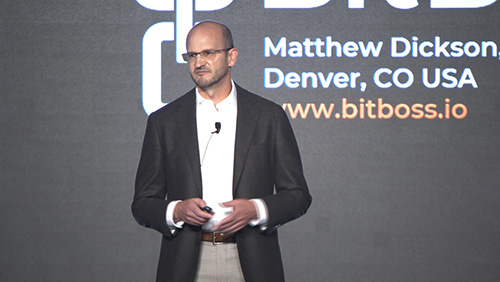Bitcoin and blockchain technology are both very promising for the future of gambling, but they’re both looking for the right killer app to break out into the industry. Bitboss has been working on Bitcoin SV applications and hardware that could do just that, and at the recent CoinGeek Seoul conference, Matthew Dickson, CEO and co-founder of the company, revealed how close we could be to a blockchain casino.
At the conference, Dickson began by discussing Keyring, the BSV javascript library Bitboss developed while making their Bitcoin gambling products. Keyring is available to all developers, and allows them to easily include JavaScript libraries in their own applications to provide them with Bitcoin functionality.
Blockchain gambling can also be applied to brick and mortar casinos. Bridge, a new hardware product from the company, promises to add end to end Bitcoin functionality for slot and electronic games.
With Bridge Wallet, Vault, Link, and ecosystem, Bridge technology allows casino players to play their game of choice, from which the machine will update the back-end of the casino. It also allows the casino to communicate with a player via their phone, updating them on their current credit amounts or whatever marketing promotions the casino has.
Dickson gave us an additional explainer on the side sidelines of the conference:
“Bridge is a new hardware product we designed. It’s roughly $100 U.S. right now, so it’s very inexpensive. It runs Linux, we insert it into a slot machine, and it intercepts the communications going back and forth between the slot machine and the backend server that runs a casino. And using that, we can then rout cryptocurrency, whether it’s a token or actual cryptocurrency, whatever the casino would chose, on and off the slot machine. And it replaces the traditional tickets that you print out when you want to cash out of a slot machine.
“I think the main idea we like to relay to people though, is that by moving those credits off of a piece of paper and onto the clients, or the customers cellphone, you now have a much better opportunity to market to your customer, because they always have their cellphones. And there was a time when we said that a certain demographic wouldn’t have a cellphone, an older lady may not have a cellphone, but I think those days are gone.
“So the traditional slot machine customer now has the world’s greatest marketing device in their hands, online, all day long. And by the casino connecting to their customer through the cellphone, they have new and innovative ways they can start to market.”
Dickson also chatted up some of the games that they have in the pipe, including the already released baccarat, roulette and lottery games, and the in production sicbo. They also plan to offer a Bitboss platform for other developers to build on.
We asked them how far away we could be from a blockchain online gambling site or casino that rivals a traditional one. “I think we’re very close,” he answered. “So there’s a lot of online casinos now that accept [BTC] or BSV or Litecoin, whatever it may be, as a method of payment. What we’re trying to do is actually replace the entire infrastructure so that all the transactions are happening on the chain as well. And we’ve taken a lot of care to create very high value content… These games will have provably fair built in as well. So they’ll function just as well as a traditional online product, they’ll have provably fair built in, and they’ll run on the blockchain.”
Dickson believes that if more operators adopt BSV gambling technology, they could benefit in many ways. “By using a blockchain you decouple the necessity for the client, the customer, to talk directly to the server,” he noted. “So the client can talk to the blockchain, the casino can talk to the blockchain, and they just use the chain as a data layer, and a transactional and data layer to do the communication. And by its design, security is built into every transaction on a blockchain. So it eliminates a lot of the big worries that traditional operators have today.”
Dickson also spoke about provable fairness, a concept we’ve previously explored where the player can check for themselves that the games are totally random and fair. This is a concept that regulators should be excited about too. “We’ve actually taken great lengths to talk to regulators and to talk to bodies around the world that certify products as well,” he said. “And to try to get the standards written to encompass blockchain technology… By introducing provably fair into every transaction, a regulator can look at an operator and say yes, they are doing this with 100% fairness. And that’s really what a regulators after, right?”






